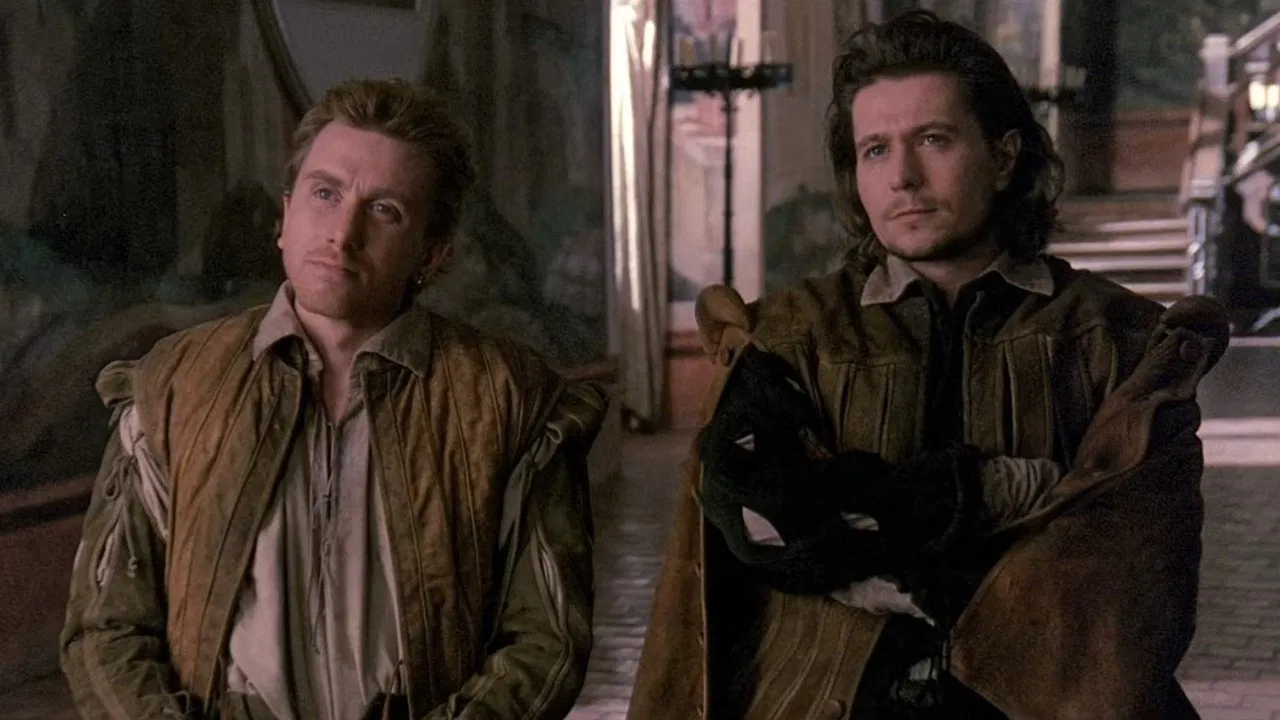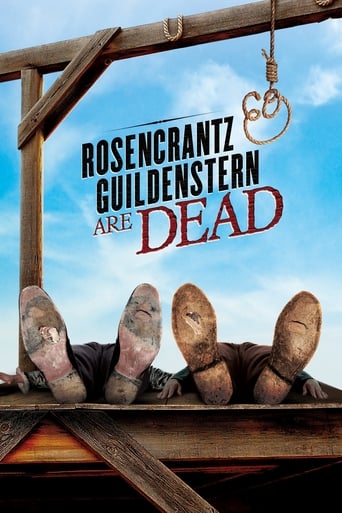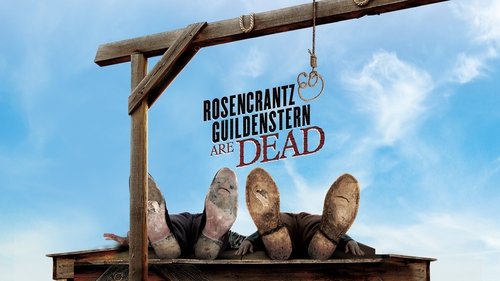


Very well executed
... View MoreSadly Over-hyped
... View MoreLoad of rubbish!!
... View MoreThis is a gorgeous movie made by a gorgeous spirit.
... View MoreI watched this movie when it first came out in 1990 and thought it was fantastic. I had never seen anything so intelligent, slippery, surreal and downright enjoyable as this play within a play. I enjoyed the experience with every fiber of my being. The two leads were sheer perfection in their roles as Rosencrantz & Guildenstern (or is it Guildenstern & Rosencrantz?). The humor is dry. The pacing is slow. The sets are limited. The setting is in Shakespeare's mid-sixteenth century. Most of these details when combined do not a good feature film make. However, in this case, it is an amazing and mesmerizing triumph.Tim Roth & Gary Oldman are energetic, confused, quizzical and supportive as the two title characters. Their chemistry is special. However, it is the twisted, genius screenplay by the writer/director, Tom Stoppard, that is the true star of this movie. Based on two very minor but pivotal characters in William Shakespeare's "Hamlet", Stoppard has pulled the curtain back to show what these two hapless characters are thinking when they realize all too late that their fates are not their own. Walking in circles without direction, talking in circles without ever having meaning, playing "word tennis" without rules yet realizing the rules are of their own choosing... It is inspired literature that translates into a beautiful story.With an exemplary supporting cast of Medieval players led by American actor Richard Dreyfuss and a ridiculously talented group of actors as the "real" Hamlet characters, this story plays with the English language as though the audience is intelligent and following the leads to their inevitable end. This is the type of writing that all aspiring writers should study. To take Shakespeare's Old English and weave it throughout the narrative while the lead characters come in and out of the actual "Hamlet" play while explaining their predicament all the while. There is no cheap voice-over narration. The action/direction falls on screen with all it's beauty, all it's faults and all it's genius.This movie should not be watched as a stand-alone story. If you have never read/seen "Hamlet" either in print or on stage, you will not understand all the ins-and-outs of the screenplay fabric. The story relies on the audience having already understood the direction of our anti-heroes. However, if you do understand "Hamlet", you will enjoy a fantastic story unfolding on the screen before your eyes. This is a beautiful movie that will keep you engrossed from beginning to end. I can't recommend it highly enough.
... View MoreRosencrantz & Guildenstern Are Dead (1990) was written and directed by Tom Stoppard. Everyone familiar with Shakespeare's Hamlet knows that it's a play with many subplots. One of the minor subplots concerns two young fellow students of Hamlet--Rosencrantz (Gary Oldman) and Guildenstern (Tim Roth).R & G are famously "sent for" by King Claudius and Queen Gertrude in order to learn what Hamlet is up to. Hamlet immediately understands this, and uses this knowledge for his own purposes. Later, R & G are dispatched to England with Hamlet, with notably bad results for them. The two are really peripheral to the main action of the play, and none of the major characters pays them much attention.Tom Stoppard, who is an absolute genius in his mastery of language, turns the play on its head and puts Rosencrantz and Guildenstern at the center of the plot, with Hamlet, the King and Queen, Ophelia, and all the rest at the periphery. R & G know that they're lightweights compared to the other characters, but they do their best to make sense of their lives and their roles in the action surrounding them. At the same time, they carry on a running verbal game, with arcane rules that only they understand.Both Oldman and Roth are superb. In the supporting cast--remember, this isn't Hamlet-- I would single out Richard Dreyfuss as the Player King for particular praise. (Interestingly, Dreyfuss was equally good when he played King Claudius in the BBC version of Hamlet.)We saw the play on the stage many years ago. As far as I can remember, the film follows the play closely. Both are worth seeing. We saw the movie on DVD. I think it would work better on the large screen, but it worked well enough to make it worth renting or buying. This is an outstanding movie--don't miss it.
... View MoreSince this is the only film that I have seen that falls into the genre that is known as 'the Theatre of the Absurd' it would be quite premature of me to call it a classic example of the genre, however an example of the genre is what this film is. Based around two minor character's in Shakespeare's Hamlet, the movie moves through the back rooms of Castle Elsinore while Hamlet is played out behind the scenes. The two main characters step into and out of the play as happens in the play, however the entire focus of this movie is on Rosencrantz and Guildenstern.To say that this film gives them a voice is a misnomer. We are reminded, constantly, that they are minor characters and nobodies. As is said at the end of the film, the play ends with the death of a king, a queen, princes, and a couple of nobodies. In fact, when Hamlet is acted out before them by the tradgedians we are told that all in all eight characters die. However they point out that only six corpses are noticed, until their characters are hung right at the end. In the play we do not know of Rosencrantz and Guildenstern's fate until the messenger arrives and says 'Rosencrantz and Guildenstern are dead'.The film is about the meaninglessness of life and the inevitability of death. At the beginning the Tragedian, when talking to the heroes (if that is what one would call them) about what plays are available to watch, he says that the one compulsory theme is the blood 'they all end in blood. Blood is compulsory'. Further, when one of them picks up a coin and tosses it, and it always lands up heads, it is a key to the inevitability of the end. Further, the Tragedian (who provides a commentary throughout the movie, and who, unlike the other characters, cannot die) says that everybody is to die at an appointed time, and they cannot escape it. Even when Rosencrantz and Guildenstern finally discover their fate, it is too late to avoid it. Even though he say at the end 'maybe there was some time that we could have said no' suggests that they had a choice, but in reality, the did not.There is no purpose or plot to the play, which is what one expects from such a play (I should call it a film, but it was originally made as stage play and adapted to the theatre by Tom Stoppard). It simply follows the action of the play that it leeches from. There is direction, and the direction of the play is towards the death of Rosencrantz and Guildenstern. However their entire existence within the play is meaningless, which is what we get from the Theatre of the Absurd, that is the meaninglessness of life.Another aspect of this play is the question and answer. They are always talking about questions and answers, though they do not seem to know what the question is to get the answer that they want. They even play a game on a tennis court called question and answer. The goal is to answer a question with a question, and when somebody asks the wrong question, or gives a statement as an answer, then the other player scores. The scores are the same as with tennis, however this is not a sport or a game that they are playing, but an exploration of life, in particular when the questions we ask are answered with questions, and to give a statement as an answer is incorrect.The final thing that I wish to touch upon (and indeed one could explore quite deeply into this play) is the play within a play. Shakespeare loves to use that technique in his plays, however Stoppard takes it to the nth degree here as in one section of the play, it literally goes off into infinity, and are then brought back to reality with the scream of a guilty king. The whole play within a play is seen with the Tragedian being a major character in the film, but the play that they rehearse and show the king is Hamlet. We know this because we see the ending of the play (the sword fight and the two dead nobodies) before we see the beginning, so that by seeing the ending, we know where it is heading. Further, it is when the scene where the players play the play in front of the king, and it is that point in the play, and in the play within a play, and so on to infinity, that the king reacts (as opposed to the beginning where the the king is killed and his murderer marries the queen, thus denying Hamlet his throne).While I could go on more about Hamlet's motives and such, I feel that this should be left for another time, because this play is not Hamlet, and it is definitely not Shakespeare. The themes in Shakespeare are vastly different to the Theatre of the Absurd, and in fact, the whole concept is anachronistic to Shakespearian literature. However, I will mention that this film does provide a commentary to the play, however it pushes the meaninglessness and absurdity of life to the for front and the question of motive to the background.
... View MoreTom Stoppard's "Rosencrantz & Guildenstern Are Dead" is a brilliant existential twist on a classic story (Shakespeare's "Hamlet") and classic storytelling. It's sharp, witty, well-acted and thought-provoking in any number of ways, being both memorably absurd and surprisingly truthful.It's hard to scrutinize, but the truth is that Stoppard's Tony-winning 1968 play doesn't offer an ounce of proof as to why it belongs on the screen. It's a contemplative story, one that's heavy and dependent on dialogue. It's the struggle of all stage-to-screen adaptations, but where others have succeeded in shedding new light through that transition, Stoppard's re- imagining of his own work lacks a visual edge, perhaps explain why he never took up the director's chair again.The story follows "Hamlet" characters Rosencrantz (Gary Oldman) and Guildenstern (Tim Roth), two remarkably unimportant characters from the play who are part of the tragedy's final body count for no reason other than being at the wrong place at the wrong time. Stoppard's story explores the play from their perspective: Were they even aware of what was unfolding around them? What was the point of them being there -- their purpose? Why did they die? These questions also fuel the film.Stoppard paints them as goofball characters that despite great wit and sophistication, remain completely oblivious to everything around them until it's too late and their prescribed fate takes over. Roth and Oldman handle these extremely random conversations that bounce between the literal and figurative playfully yet with great strength. They're a heck of a duo. Rosencrantz also has a knack for discovering basic laws of physics but then losing them amidst his and Guildenstern's struggle to figure out what exactly it is they're doing in all of this Hamlet business. Stoppard uses these examples and a fitting opening bit about the probability of a coin flip to suggest the conflict between randomness and order in life and nature.Also significant is the group of traveling tragedians led by Richard Dreyfuss, who end up being the ones to put on the play that Hamlet uses to catch his Uncle Claudius realizing his sin. They add the element of theater and tragedy into the meditative stew, reminding us that this story ("Hamlet") is indeed a work of fiction that was created to a purpose. He preaches in fate, that in tragedy everyone who dies dies because that is what's expected of them. It's a real head-churner, but as philosophically impressive as it is, none of that juicy thought is derived from the visual experience of the film. What characters say in this film is ten times more important than what they do, or namely how they do it. Stoppard throws in some smaller visual elements and undoubtedly he must've added something to the screenplay that wasn't on the stage. After all, he had nearly 20 years to think about his work between the play and the film, so naturally he would've wanted to make some changes. But nothing about the way he films this story enhances the existential dialogue between characters as well as between film and audience.Having never seen the play, "Rosencrantz & Guildenstern Are Dead" was an enjoyable, thought-provoking film experience, but I would imagine having already been exposed to its meta-exploratory ingenuity, those coming to the film with previous exposure might not feel anything more fulfilling than simply seeing it in a three-dimensional world.~Steven CVisit my site at http://moviemusereviews.blogspot.com
... View More